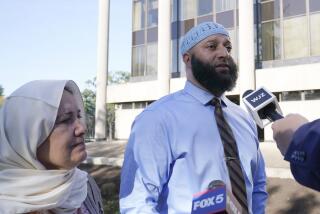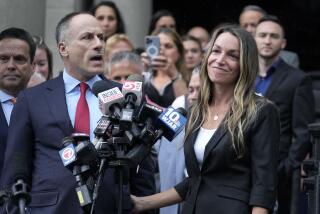Appeals court upholds new trial for Adnan Syed, subject of widely acclaimed ‘Serial’ podcast
- Share via
Reporting from Baltimore — A Maryland appeals court on Thursday upheld a ruling granting a new trial to a man whose conviction in the murder of his high school sweetheart became the subject of the popular podcast “Serial.”
Adnan Syed was convicted in 2000 and sentenced to life in prison for the killing of Hae Min Lee, whose body was found in Baltimore’s Leakin Park.
Syed maintained his innocence and in 2014 his case attracted international attention when it was featured on the “Serial” podcast, which was downloaded millions of times and prompted legions of listeners to scrutinize the case online.
Thursday’s decision remands the case back to Circuit Court, granting Syed a new trial there.
The ruling could be appealed to the Court of Appeals, the state’s highest court, which would mean many more months before Syed finds out whether his conviction will remain or if he will get a new trial.
Maryland Atty. Gen. Brian Frosh’s office said it is “currently reviewing today’s decision to determine next steps.”
Baltimore State’s Atty. Marilyn J. Mosby’s office would be tasked with prosecuting Syed were a retrial to move forward. Her office said it was reviewing the appeals court’s opinion on Thursday, but otherwise declined to comment.
In writing the Court of Special Appeals opinion, which was released Thursday, Chief Judge Patrick L. Woodward wrote that a “deficient performance” by Syed’s attorney during his initial trial — namely, her failure to call a witness named Asia McClain — “prejudiced Syed’s defense.”
Syed was granted a post-conviction hearing in February 2016, during which his new attorneys argued that his original counsel had failed to call McClain — now McClain Chapman — as an alibi witness. They also questioned the reliability of cellphone evidence used to place Syed at the spot where Lee’s body was found.
Four months later, retired Judge Martin Welch, who had denied Syed’s previous request for a new trial, vacated his conviction and ordered a new trial. The judge said questions about the cellphone evidence should have been raised by Syed’s original team.
The state appealed a lower-court judge’s ruling last year that vacated Syed’s conviction and ordered a new trial. Syed’s attorneys then filed a separate conditional appeal, asking the court to look at the alibi issue.
In the opinion Thursday, Woodward found that, “there is a reasonable probability that McClain’s alibi testimony would have raised a reasonable doubt in the mind of at least one juror about Syed’s involvement [in] Hae’s murder, and thus ‘the result of the proceedings would have been different.’”
The Court of Special Appeals had considered the case during a hearing last June.
There, judges had focused more on the alibi witness angle, questioning attorneys for Syed and the state attorney general’s office about what weight they should give to McClain Chapman, who claimed to have seen Syed at the Woodlawn Library when prosecutors said Lee was killed.
“How can you possibly evaluate an alibi witness without speaking to her?” Woodward asked during the state’s presentation by Thiru Vignarajah, a special assistant attorney general. Vignarajah referred questions to Frosh’s office on Thursday.
The judges asked C. Justin Brown, Syed’s current attorney, whether there was any case law that would establish that Syed’s attorney, the late M. Cristina Gutierrez, provided ineffective counsel to Syed because she did not speak to McClain.
Judge Kathryn Grill Graeff asked Brown whether it is a defense attorney’s responsibility to speak to any possible alibi witness — to which Brown said yes.
In a dissent published alongside the court’s majority opinion issued Thursday, Graeff seemed to adopt the argument of the state that Gutierrez had good reason not to call McClain as a witness. Graeff noted records in the case, including a detective’s notes on communications between McClain and Syed, “indicate potential cause for concern regarding the trustworthiness of Ms. McClain’s alibi, and therefore, the reasonableness of counsel’s decision not to contact Ms. McClain or pursue her alibi.”
Graeff wrote, “To the extent that Ms. McClain’s potential alibi could give the prosecution ammunition to argue that Syed and Ms. McClain were working together to falsify an alibi, it would be a reasonable decision not to contact Ms. McClain to pursue that alibi.”
Fenton and Rector are reporters with the Baltimore Sun. The Associated Press contributed to this report.
Twitter: justin_fenton
More to Read
Sign up for Essential California
The most important California stories and recommendations in your inbox every morning.
You may occasionally receive promotional content from the Los Angeles Times.










